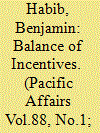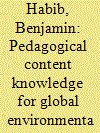| Srl | Item |
| 1 |
ID:
136711


|
|
|
|
|
| Summary/Abstract |
This study is concerned with motivations driving North Korea’s interaction with the United Nations Framework Convention on Climate Change, drawing on information from treaty reporting documents, along with project reports compiled by international agencies and official statements released by the North Korean government. The article draws on causal inference to explore the hypothesis that the leadership perpetuation and state survival imperatives of the North Korean government represent the most likely explanation for North Korea’s interaction with the international climate change regime. It finds a strong probability that North Korea is utilising the UNFCCC as a capacity-building vehicle across its agricultural and energy sectors, a weak issue_images_88_1_Hydroelectric dam at Sinpyong (July 2012)_Habibpossibility that North Korea’s climate change vulnerability is a compelling incentive for greenhouse gas mitigation, and the weak possibility that North Korea is using the Clean Development Mechanism under the UNFCCC as a means for generating foreign currency revenue. The paper argues that the balance of incentives underpinning these motivations can be linked to the leadership perpetuation and state survival imperatives of the North Korean government.
|
|
|
|
|
|
|
|
|
|
|
|
|
|
|
|
| 2 |
ID:
096013


|
|
|
|
|
| Publication |
2010.
|
| Summary/Abstract |
Climate change is a new variable that may weaken the Kim Jong-il regime by disrupting North Korea's agricultural sector, leading to greater food insecurity and erosion of the state's institutions. North Korea has limited capacity to adapt to climate hazards, which could exacerbate existing stresses and push the regime into terminal decay.
|
|
|
|
|
|
|
|
|
|
|
|
|
|
|
|
| 3 |
ID:
143912


|
|
|
|
|
| Summary/Abstract |
This article deconstructs United Nations Security Council (UNSC) Resolution 2094 through the preambulatory statements, objectives, obligations, and implementation and enforcement provisions of UNSC Resolution 2094. The article proceeds in three parts. First, it reviews the academic literature on UNSC sanctions and their application in the North Korean case. Second, it deconstructs UNSC Resolution 2094 according to the common structural components of international legal instruments to assess the level of congruence between the objectives of UNSC Resolution 2094, its enforcement mechanisms and outcomes. Third, it explores the weaknesses of UNSC Resolution 2094, focusing on the gap between the objectives and enforcement mechanisms found in the resolution. The inability of the UNSC sanctions regime to prevent North Korea reaching the cusp of becoming a nuclear weapons power is evidence of the international community's weak leverage over Pyongyang, a situation arising from the vulnerability of South Korea to a North Korean attack and the cross-cutting strategic priorities of China; the absence of economic linkages between the Democratic People's Republic of Korea and the primary sanctions-sender state in the USA; and North Korea's commitment to a nuclear weapons capability as the foundation of its medium-term economic development strategy, its institutional governance structure and associated ideological commitments.
|
|
|
|
|
|
|
|
|
|
|
|
|
|
|
|
| 4 |
ID:
185555


|
|
|
|
|
| Summary/Abstract |
North Korea’s vulnerability to environmental shocks is an under-appreciated variable in the country’s human insecurity profile. Based on the United Nations Development Programme’s seven pillars of human security and using primary and secondary sources on weather, food and health conditions, the article argues that the intersection of environmental shocks with multiple human insecurities create an exacerbating chain effect on people’s lives in North Korea and prompt adaptive responses from both individuals and the government. We find the regional variations in adaptive capacity as the data shows more people from Hamgyong and Yanggang provinces used outbound migration as an option to survive than other areas, mediated by geography and gender. While Kim Jong Il largely failed to respond to human security threats, Kim Jong Un has adopted a few limited measures to mitigate further damages.
|
|
|
|
|
|
|
|
|
|
|
|
|
|
|
|
| 5 |
ID:
102680


|
|
|
| 6 |
ID:
160964


|
|
|
|
|
| Summary/Abstract |
Pedagogical design in international relations and environmental politics needs to help students become active participants in the sustainability transition. This article documents the use of a blog-based assessment activity in an international relations undergraduate course Global Environmental Politics. The activity has a multifunctional design that draws on different forms of pedagogical content knowledge to enhance student learning. These include metacognitive skill development in relation to environmental politics, cultivation of professional networks in the environment and sustainability field, and methods of active participation in the politics of the sustainability transition. Blog-based representations of pedagogical content knowledge can be replicated across international relations curricula.
|
|
|
|
|
|
|
|
|
|
|
|
|
|
|
|
| 7 |
ID:
096105


|
|
|
|
|
| Publication |
2010.
|
| Summary/Abstract |
North Korea is unlikely to relinquish its nuclear program because of its importance to the perpetuation of the Kim regime. This conclusion arises from the observation that the nuclear program has been a long-term project spanning several decades, culminating in denuclearisation negotiations, which have followed a cyclical pattern in which the North has provoked crises to extract concessions and gain leverage vis-a-vis regional states. It is clear that the nuclear program has great intrinsic value to Pyongyang. First, this paper argues that the sunk costs of previous investment in the nuclear program, as evidenced by the infrastructure for the country's nuclear fuel cycle, create forward momentum favouring continuation of the nuclear program. Second, it argues that the nuclear program solidifies Kim regime rule as an institutional buttress, as a prop for the domestic economy, and as a vehicle for ideological legitimation. The paper is a unique contribution, which explicitly links the Kim regime's proliferation calculus to the economic and bureaucratic imperatives of regime perpetuation, as well as the sunk cost of previous investment in the nuclear program. It provides a coherent explanation for North Korea's consistent unreliability in negotiations, and offers insights into future prospects of the denuclearisation process.
|
|
|
|
|
|
|
|
|
|
|
|
|
|
|
|